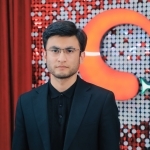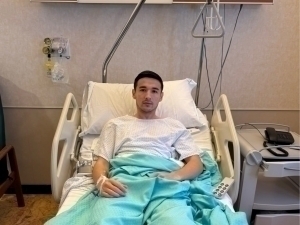Midweek: Brutality in Moscow, Chinese recruits in Ukraine, and regional backlash
Review
−
16 April 2025 5855 11 minutes
“Chinese men want to participate in the mass invasion”
Chinese citizens Wang Guangxiu and Zhang Renbo, who were captured by the Ukrainian Armed Forces on April 4 and 5 this year, gave a detailed account of their experiences at a press conference organized by the Security Service of Ukraine on April 14. The two Chinese prisoners spoke about how they ended up on the front lines, the threats and deceptions used by the Russians, and the fact that the online portrayals of the Russian army’s "power" are misleading.
Earlier reports had suggested that they had voluntarily joined the Russian front lines. However, Guangxiu and Renbo denied this, stating they had no intention of fighting for the Russian army and were deceived into going to war. They also emphasized that they had no connection to the Beijing government. Despite this, a former Western intelligence official interviewed by Reuters claimed that Beijing may have indirectly sent the Chinese men to gain combat experience.
According to Guangxiu, he left China due to worsening living conditions and unemployment during the COVID-19 pandemic. He initially agreed with a Russian recruiter to work as a rehabilitation therapist for wounded soldiers. However, upon arriving in Russia, he was drafted into the army and sent to the front just three days later. The most alarming part is Guangxiu’s claim that Russian military propaganda on TikTok is influencing many Chinese men to consider going to war. As Ukrainian President Volodymyr Zelensky previously stated, although the confirmed number of Chinese recruits in the Russian army is currently estimated at 155, the real figure could grow rapidly.
Zelensky also elaborated on how Chinese recruits are being brought into the conflict: they first travel to Moscow, undergo 3-4 days of medical screening, and train for 1-2 months at military camps. They are issued migration documents and Mir payment cards, onto which money is transferred. The Guardian reported that Chinese mercenaries are being offered a one-time bonus of up to $27,000 and a monthly salary of around $2,500.
These revelations are prompting speculation. Guangxiu’s account of losing his job and the financial incentives being offered to mercenaries are raising broader questions. For context, average monthly wages in China vary greatly by region. In cities, the average is around $1,385, but in rural areas, it can drop to $235–$375. In Guangxi Province, where unemployment is particularly high, joblessness affects millions. The World Bank estimates China’s unemployment rate at 5.4 percent, which translates to around 75.6 million people. With most unemployed being men, this creates a potentially large recruitment pool for the Kremlin’s war campaign, especially as TikTok propaganda targets this demographic.
Describing their ordeal, Guangxiu said that due to the language barrier, he communicated with recruiters using only gestures. He received no information in Chinese, and the contract terms were not properly explained. Speaking at the press conference, he warned other Chinese citizens not to trust Russia and said he found the Russian military weaker and Ukraine stronger than expected.
The second captive, Zhang Renbo, said he originally went to Russia as a tourist and was later offered a construction job. But things quickly changed. Influenced by Russian propaganda, he believed that Ukraine had already been defeated. He was promised a salary ranging from 80,000 to 260,000 rubles (roughly $1,000–$3,000). Although he initially received a card loaded with 200,000 rubles (around $2,400), Russian soldiers soon confiscated his phone and the money. He was also threatened. Both prisoners claimed they did not kill any Ukrainian soldiers and that their front-line service was brief. They believe they were assigned to Russia’s 7th Motorized Rifle Brigade. Both have expressed a desire to return home through a prisoner exchange, a possibility that Zelensky has said he supports.
Bangladesh takes a stand against Israel with its passport policy
Bangladesh has reinstated the phrase “except for Israel” in its passports after roughly 100,000 people demonstrated in Dhaka on April 12 in support of Palestine. Protesters gathered around Dhaka University, expressing solidarity with Gaza and calling for an independent Palestinian state.
Participants carried symbolic coffins and images of civilian casualties. They also burned pictures of US President Donald Trump, Israeli Prime Minister Benjamin Netanyahu, and Indian Prime Minister Narendra Modi in protest of their support for Israel. The opposition Bangladesh Nationalist Party and other Islamist groups also backed the protest.
For decades, Bangladeshi passports carried the phrase “Valid for all countries except Israel.” This was removed in 2021 by former Prime Minister Sheikh Hasina’s administration, which claimed the change aligned passports with global standards. However, Bangladesh still did not recognize Israel and continued to ban travel there. Bangladesh remains one of 29 UN member states that do not recognize Israel. The country, with over 172 million citizens—91 percent of whom are Muslim—prohibits both travel to Israel and entry of Israeli passport holders.
Uzbek woman suspected of killing husband in Turkey
The Consulate General of Uzbekistan in Istanbul is once again in the public eye following the suspected murder of a Turkish citizen by his Uzbek wife. The incident occurred on April 6 at around 9:30 p.m. in an apartment in the Karliktepe neighborhood of Istanbul’s Kartal district.
It was initially reported that a fight broke out between 28-year-old Uzbek national S.T. and her husband of four years, Emre Erim, due to financial tensions. During the argument, the woman allegedly stabbed and killed him. The victim’s body was sent for forensic examination, and S.T., who tried to flee, was detained.
However, as the investigation unfolded, alternative theories emerged. One version suggested that while the deceased was strangling the woman, someone else stabbed him from behind. This raised the possibility that someone other than the wife committed the stabbing, especially since others were reportedly present in the apartment at the time.
The Uzbek Consulate confirmed this version and noted that S.T.'s aunt had stated the suspect couldn’t have committed the murder. The family also reported that the suspect's mother became seriously ill after hearing the news. Preliminary findings suggest that the husband had been abusive and consumed alcohol regularly. While the identities of other people in the apartment remain unknown, the suspect is receiving legal and consular support, and the situation is being monitored by Uzbek authorities.
Trump administration targets Harvard and the federal budget
Since the beginning of Donald Trump’s second presidential term, legal battles have followed him closely—from “Freedom” and “Voice of America” to “Associated Press” and now Harvard University. His administration has announced a review of $9 billion in federal funds allocated to Harvard, including $8.7 billion in grants and $255.6 million in contracts.
Harvard faculty and the American Association of University Professors have taken legal action, accusing the Trump administration of using financial threats to impose its political ideology. The lawsuit argues this violates academic freedom and free speech. The scrutiny of Harvard intensified after campus-wide pro-Palestinian protests. Multiple federal agencies launched investigations into how Harvard spends its government funding.
In early April, the Trump administration issued demands for Harvard to eliminate certain programs to avoid funding cuts, programs that it labeled as spreading “hateful propaganda.” However, critics claim the administration’s goal was to suppress student support for Palestine.
A letter sent to Harvard on March 31 outlined conditions for continued federal support, including banning masks at protests and increased cooperation with law enforcement. Harvard faculty considered these demands violations of university policy and free expression. On April 11, the administration issued another letter demanding governance and admissions reforms. When Harvard did not comply, the Department of Education’s Office of Combating Anti-Semitism froze $2.2 billion in grants and $60 million in contracts on April 14, citing the need to protect Jewish students and stop anti-Israel protests. In response, Harvard President Alan Garber firmly stated that the university would not yield to the government’s demands.
The federal budget issue extends beyond Harvard. According to Reuters, the Trump administration also aims to cut the State Department’s budget by 50 percent, amounting to about $30 billion by 2026. This would involve closing 10 embassies and 17 consulates, mainly in Africa and Europe.
The cuts would also affect the US Agency for International Development (USAID), which has now been folded into the State Department. The Associated Press, which accessed the budget proposal, reports plans to eliminate funding for UN and NATO contributions, halve foreign aid, and end support for most global health programs—except for minimal funding for HIV, tuberculosis, and malaria. While these proposals are still preliminary, both the State Department and Congress are expected to resist them. The Washington Post also confirmed that the proposed cut to the State Department budget amounts to $27 billion.
Bishkek demands Russia’s explanation
Last weekend, Russian special forces (OMON) carried out a particularly brutal raid on migrants at the Bodrost bathhouse in Moscow. Central Asian migrants who were simply resting there were subjected to degrading and violent treatment. The footage shows them piled together, half-naked, forced to lie face down and crawl while being beaten by officers. According to a source cited by Readovka, around 40 migrants were detained. They were ordered to lie on the floor and were later taken away. Several of them are now facing charges under the Russian Code of Administrative Offenses for “violating the rules of entry and stay in the country.” The unofficial leader of the group is under investigation, and a criminal case may be opened against him under the charge of “Organizing Illegal Migration.”
Reports indicate that most of the bathhouse visitors were migrants from Uzbekistan and Kyrgyzstan. The video, shared widely on social media, included a caption: “Many Kyrgyz people come here.” One Facebook user reacted strongly, writing:
“People came to the bathhouse just to relax. But instead of steam and peace, the OMON raided, shouted, and laid everyone on the ground like animals. Many have large bruises and signs of beatings on their bodies. This is not an inspection, this is torture.”
Some social media users claim the raid was prompted by reports that migrants had taken over the bathhouse and were not allowing other patrons to use it. There were also complaints that the migrants treated ethnic Russians with hostility, prompting the authorities to intervene. Still, the silence from Russian law enforcement agencies has sparked outrage in Kyrgyzstan. On April 14, Kyrgyz Deputy Foreign Minister Almaz Imangaziyev summoned Russian Ambassador Sergey Vakunov to formally protest the treatment of Kyrgyz citizens. An official note was handed over, demanding an investigation into the incident and disciplinary action against any Moscow law enforcement personnel found to have used unjustified force. The Kyrgyz government also stressed the need to protect the rights of its citizens and prevent similar incidents that could damage the strategic partnership between Kyrgyzstan and Russia.
As mentioned, most of the migrants at the bathhouse were reportedly from Kyrgyzstan and Uzbekistan, meaning that Uzbeks were likely among the victims. Following the Kyrgyz Ministry of Foreign Affairs’ swift action, Uzbekistan's Legislative Chamber’s Committee on International Affairs, Defense and Security responded by sending a parliamentary request to Foreign Minister Bakhtiyor Saidov. The request sought information on what is being done to protect the rights and legitimate interests of Uzbek citizens abroad.
This request also reignited public criticism of the Uzbek Foreign Ministry, which has frequently been accused of failing to respond adequately when Uzbeks are victims of crime or die abroad. In many cases, there is little to no clarity on how the bodies of deceased citizens are repatriated. Families often remain in the dark about how to bring their loved ones home.
The ministry has also been criticized for not taking a strong stance against the mistreatment of Uzbek labor migrants, especially in Russia, and for remaining passive in cases where Uzbek citizens are accused or convicted of crimes abroad. One notable example was the conviction and death sentence of three Uzbeks in the UAE for the murder of a Jewish rabbi. Though the ministry confirmed the case only through informal responses to journalist inquiries, it limited itself to vague statements like “we are clarifying details.”
In this instance, however, the ministry issued a prompt reply. Its spokesperson, Ahror Burkhanov, emphasized that protecting the rights of Uzbek citizens abroad has always been a priority. He noted that Uzbekistan’s diplomatic and consular missions are in direct contact with the authorities of relevant countries to ensure this.
“Each case is thoroughly studied, and necessary measures are taken to ensure the legitimate rights and interests of our citizens. The Ministry of Foreign Affairs regularly informs the public about this work through its monthly briefings,” Burkhanov stated.
He added that the ministry will provide timely responses to all appeals and inquiries on such matters.
Live
All



